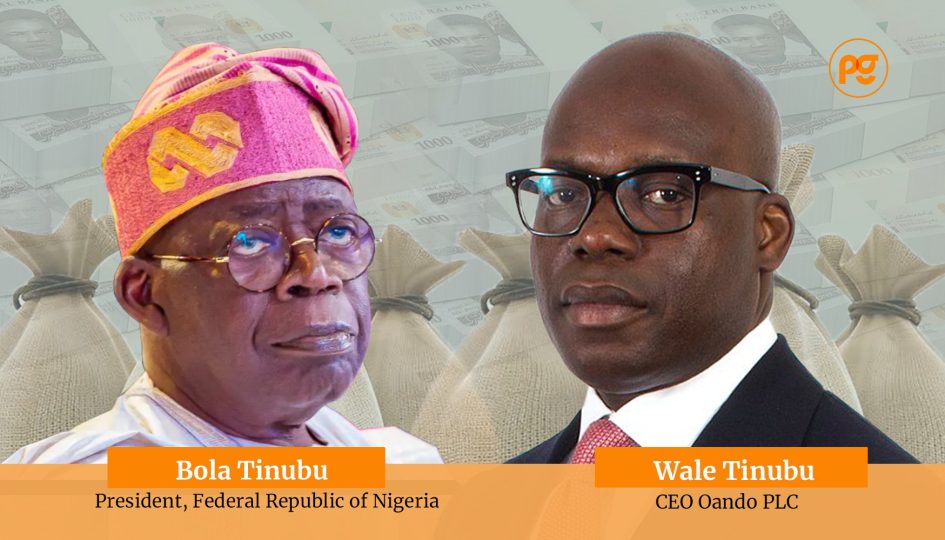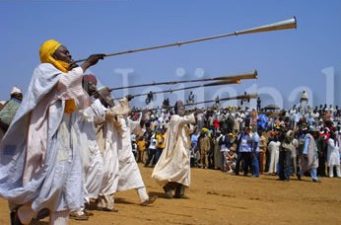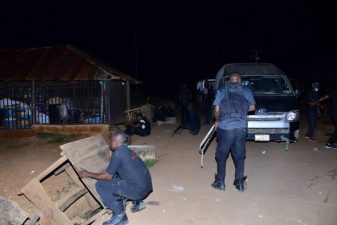Peoples Gazette’s recent report titled, “Tinubu returns OPL 245 ownership to Shell-Eni, after cornering onshore assets to nephew Wale’s Oando” has put questionson the lips of many, begging for answers as relevant stakeholders need confirmation and probe of report because they say such serious information cannot be silent over. Details below:
A seething senior administration official criticised the president as spending every day trying to “validate his worst inclinations as a dyed-in-the-wool con man.”
President Bola Tinubu has restored the ownership of OPL 245 to European oil majors Eni and Shell, Peoples Gazette learnt this week, all but assuring an end to a yearslong corruption inquiry into the massive yet highly controversial deepwater oilfield.
But the president agreed to the deal largely to expand his own riches when he was supposed to maximise its benefits for the Nigerian people, according to two officials familiar with the development. Months ago, as a precursor to the agreement finalised in London and Paris over the past week, Eni had transferred its onshore assets to Oando, run by the president’s nephew Wale Tinubu.
The Gazette was told that there was an arrangement brokered by Mr Tinubu’s controversial ally Gilbert Chagoury that helped Oando acquire Nigerian Agip Oil Company Ltd and other Nigerian assets of Eni towards the end of 2023. The president also withdrew all existing cases against Shell and Eni from international tribunals and allowed both firms to take back control of OPL 245 based on the old contract under Goodluck Jonathan and without fresh dues to Nigeria.
Following the transfer, which came in September 2023, Oando rapidly doubled its oil reserves to nearly one billion barrels, the company said. Both Eni and Oando did not disclose the amount involved, saying it was “price sensitive.” American investment banker Jefferies Group, however, said the deal was around $500 million.
The sale appeared to have landed a hitherto struggling Oando its biggest-ever payday just within the first six months of its CEO’s uncle, believed to own a secret interest in the firm, being Nigerian president.
Once a dealer
The deal came last week after Nigerian officials departed Abuja on January 23 for London, where a so-called “new resolution agreement” was entered with representatives of the two oil firms. Those The Gazette heard were on the trip included state petroleum minister Heineken Lokpobiri, head of Nigerian upstream regulator NUPRC Gbenga Komolafe, attorney-general Lateef Fagbemi and anti-graft chief Ola Olukoyede.
After signing the deal in London, the officials left for Paris to meet the president with the details, The Gazette heard. Mr Lokpobiri mounted enormous pressure on the Nigerian team to ensure the deal was reached, a source said.
“He kept saying the president had an interest in the deal,” an official said. “We later found out that the deal was the main reason the president travelled to Paris.”
One seething official feared the agreement could backfire and ensnare Nigeria in another round of international corruption controversy. Already, the newly revamped national oil company NNPC had distanced itself from the deal, saying it was never consulted by Eni despite holding interest in the business as a joint venture.
In a September 4 letter to Eni, NNPC decried the Oando sale as a major breach and threatened to explore options towards reversing it and holding the Italian group accountable.
But Eni promptly fired back, saying it was under no obligation to inform its Nigerian counterpart before disposing of the assets.
“NNPC has a pre-emption right on the JV shares, but Eni doesn’t have any contractual obligation to inform beforehand NNPC about the deal, also because the information was price sensitive for the potential buyer,” the firm stated.
The Gazette heard that the NNPC has since backed down after learning of the president’s involvement in the contract. A spokesperson for the firm did not answer a call seeking comments.
The deal appeared to suggest that Mr Tinubu was not ready to let go of his reputation as one of Nigeria’s fabled plutocrats, another official said this week.
“We thought that he would want to use the office of the president to rehabilitate himself,” a senior administration aide told The Gazette under anonymity on Tuesday evening. “But it seems that he spends every day trying to validate his worst inclinations as a dyed-in-the-wool con man.”
Prior to his election in February 2023, Mr Tinubu was the subject of a widely publicised U.S. court document that detailed his involvement in narcotics activities between the 1980s and 1990s. He was also previously exposed by The Gazette to have used his businesses to loot the Lagos treasury to the tune of billions of dollars.
Months after his election, the president was found to have gamed his way into power using falsified academic records in violation of the Nigerian Constitution. The Supreme Court sidestepped the case to keep him in power. It was the second time the now-Nigerian leader would escape accountability for forgery, coming over a decade after a federal prosecutor charged and subsequently withdrew a criminal case against him over a slew of fraudulent submissions to the electoral office INEC when he successfully sought office as Lagos governor.
Mr Tinubu has taken initial measures that convinced a section of the country about his readiness to combat corruption. He recently proactively suspended a minister accused of mismanagement, and queried another believed to be tied to the same scandal.
This week, the president also asked the NNPC to direct its revenues to the central bank, earning widespread accolades from public finance experts, including prominent members of political opposition like Kingsley Moghalu.
But beaming a spotlight on his handling of OPL-245 ownership could potentially remind Nigerians of the president’s unsavoury past and keep him under close scrutiny, one of his aides said.
Presidential spokesman Bayo Onanuga won’t speak on the deal when reached Tuesday night, suggesting instead that only NNPC and NUPRC can clarify questions surrounding the deal. Shell, Eni and Oando did not comment between Monday and Tuesday.
Lessons discarded
The oil prospecting licence 245 in Nigeria’s offshore deepwater has courted controversy since April 29, 1998, when it was first awarded by Sani Abacha to Malabu Oil & Gas Ltd, a shady shell business linked to ex-convict Dan Etete, who was at the time serving as Nigeria’s petroleum minister. Eni estimated that the field could readily produce a reserve capacity of 560 million barrels, with experts saying the block’s actual reserve ranged from six to nine billion barrels.
A 2018 report by HEDA and Global Witness found Nigeria stood to earn roughly $6 billion via long-term mining from the field, which sits about 150 kilometres south of Nigeria in the country’s territorial waters in the Gulf of Guinea.
In March 2001, Malabu transferred 40 per cent of its ownership to Shell at $18 million. But a few months later, in July, President Olusegun Obasanjo abruptly withdrew ownership of the field from Shell and gave sole ownership to state-run NNPC.
In 2002, NNPC transferred full ownership of the block again to Shell at a signature bonus of $210 million, which was locked in an escrow until all disputes had been resolved with the government, Malabu and other parties. In 2011, Shell partnered with Eni to pay the $210 million, saying it was the largest ever received by Nigeria for a prospecting licence to date.
The 2011 payment later became one of the biggest scandals of the Jonathan administration and, evidently, the biggest embarrassment Nigeria suffered abroad in its handling of oil deals. Dubbed Malabu oil scandal, it exposed how several Nigerian officials, including former attorney-general Bello Adoke, colluded with Mr Etete, a money-laundering convict, to use Nigeria as a middle-man in the murky deal. About $1.1 billion from Shell and Eni was said to have been disbursed to the Nigerian officials involved through JP Morgan.
Both Shell and Eni admitted knowledge of Mr Etete’s criminal background but, nonetheless, denied bribing him and other Nigerian officials. An Italian top court found both firms not guilty of any wrongdoing in the deal in a 2021 ruling. Mr Adoke also strongly denied any wrongdoing on behalf of himself and other Nigerian officials named with him, but a 2019 Abuja court warrant for Mr Etete’s arrest remained outstanding.
Still, a senior official said the president was hasty in pulling back from other lawsuits relating to the OPL 245 field that were instituted by the previous administration. Unlike Mr Tinubu, President Muhammadu Buhari rebuffed all pressure to resolve the matters outside international tribunals.
Mr Tinubu “discarded all the lessons Nigeria should have learnt from the Malabu oil scandal,” the official said under anonymity to steer clear of retribution. “His personal interest should not take precedence over Nigeria’s.”
50-50
Whereas Mr Tinubu prioritised his business interest around the deal, The Gazette was told Nigeria would benefit from a profit-sharing arrangement after the OPL 245 has successfully transformed into an extraction field due largely to a deal offered to the erstwhile Buhari administration.
One of our sources said Shell and Eni would be compelled to keep to an earlier proposal made to Mr Buhari’s government, but which was suspended until a final resolution of the matter had been reached.
Mr Buhari was pushing for a final decision on the civil liabilities of both Shell and Eni in London and Milan, respectively, before accepting an offer of 50 per cent of all proceeds from the field, according to sources. Mr Buhari’s argument was that the $1.1 billion, including the $210 signature bonus received by the Jonathan administration, that Shell and Eni paid to secure the licence in 2011 was a futile arrangement because the block should not have been awarded to Mr Etete in the first place.
Dan Etete
The outgone administration based its argument on Nigeria’s code of conduct statute that barred public servants from awarding federal projects to themselves. As a minister in Mr Abacha’s government, Mr Etete should not have awarded OPL 245 ownership to a firm in which he had significant interest.
With Mr Tinubu backing down from his predecessor’s $1.1 billion lawsuit against Shell and Eni in Nigeria and foreign jurisdictions, Eni also suspended its arbitration claims pending before the World Bank.
“So what we are working with now is for the president to insist on the 50 per cent that Shell and Eni proposed in the past now that the cases have been withdrawn and parties are back on the same page,” an official said. “Since he has eaten his own, he should not restrain Nigeria’s hands.”
SOURCE PEOPLES GAZETTE




